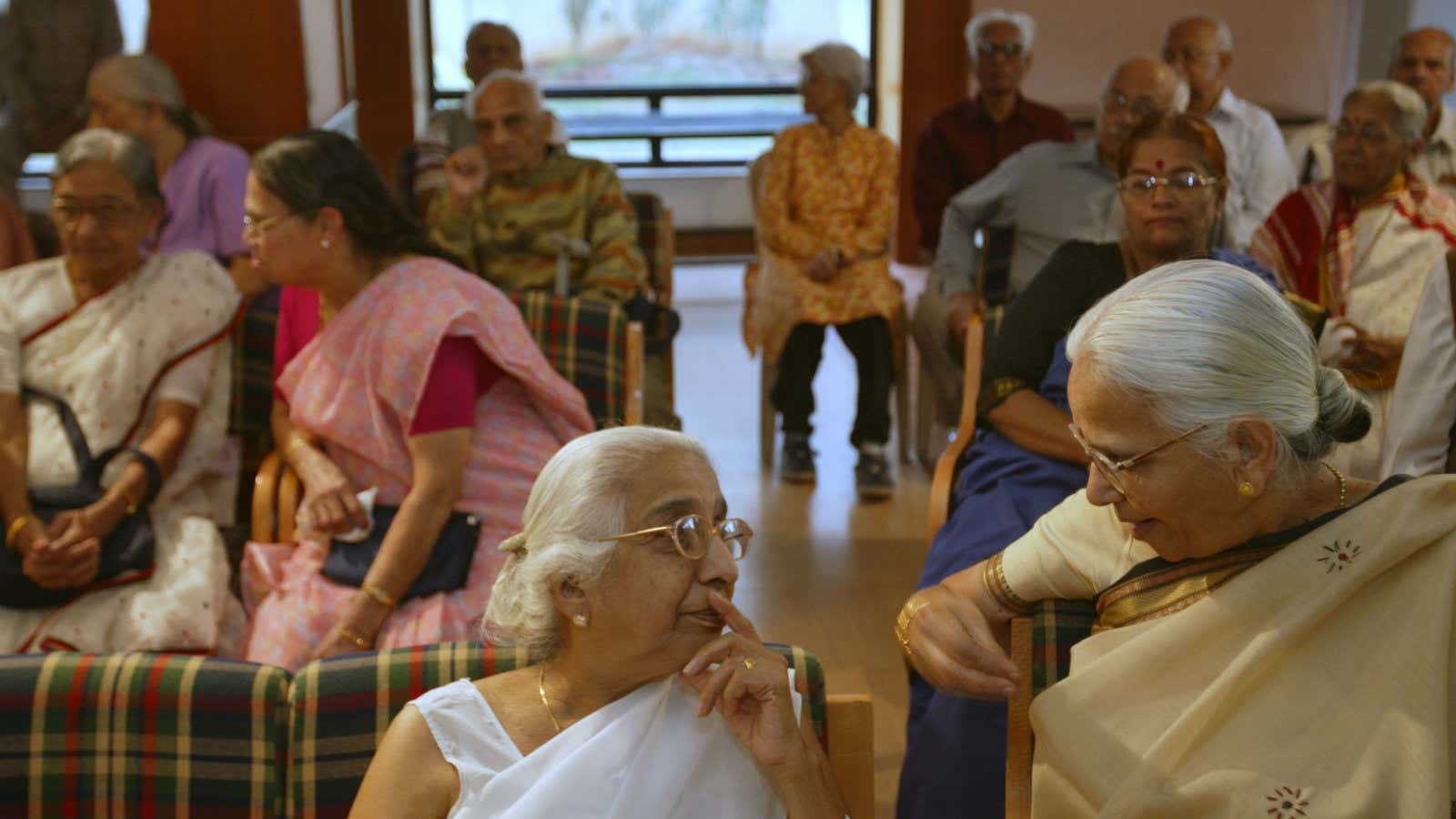India’s elderly are slowly turning to professional help to cope with the loneliness and difficulties of old age.
What was the once the responsibility of sons and daughters is now passing to paid companions, who help with everything from daily chores, like buying groceries, and visiting the doctor, to mundane things, such as reading the newspaper or having a conversation.
Over the past five years, startups offering such companions have mushroomed across India. At least five are operating in the country right now, according to a report in the Hindustan Times newspaper. These companies provide a mix of students and working professionals who visit senior citizens every week for a few hours. The visitors charge anywhere between Rs150 ($2.3) for an hour-and-a-half and Rs20,000 ($305) per month for weekly visits, the Hindustan Times said.
And this marks a significant evolution in the social norms in Asia’s third-largest economy, where taking care of the elderly has for long been viewed as a duty of the younger family members.
“We are still coming to terms with a concept as new as this,” 88-year-old Subhadra Upadhyay, whose son enrolled her with Ahmedabad-based The Family Member, told the Hindustan Times. “But we had to be practical, because Bhavesh (her son) has his own family to take care of.”
A growing need
There are 103 million Indians aged over 60 in India, according to the 2011 Census, and this figure is expected to hit 143 million by 2021. Already the elderly account for 8.6% of India’s population, the highest proportion ever.
While many of these senior citizens are cared for by their families, the country’s rapid urbanisation and economic development have made this harder to sustain. As millions of Indians have migrated to new cities in search of jobs, they’ve often had to leave behind the older members of their families. Moreover, as more Indians travel abroad for education and work, they have often settled outside the country, leaving their parents back home.
And that can often pose a problem in case of emergencies.
For instance in 2012, Prasad Bhide, who was working in the US, found it tough to find someone to care for his ailing mother back home in India. So he set up Aaji Care (Aaji means ‘grandmother’ in Marathi) to provide at-home medical and non-medical professionals to care for the elderly.
“We tried to hire several people to take care of her, but there would always be some problems with the way they administered medicines or helped her in her exercises because they were not trained personnel,” Bhide told YourStory, a startup-focused news website, in 2015.
Aaji Care provides assistants who visit seniors to talk and even play games, as well as trained nurses and health professionals. Today Bhide says, his firm gets “at least three new clients” each month, and he is now planning to expand to Pune.
Beyond providing company and medical support, some startups, including Samvedna Senior Care and First Seniors in Delhi and Maya Care in Pune, are even teaching the elderly how to adapt to the tech-savvy modern world. For instance, professionals at Samvedna provide lessons on how to use the internet and smartphone apps, including WhatsApp. The startup also conducts special classes for seniors, teaching yoga, spoken English, music, and painting at their recreational club in Gurugram.
Maya Care offers its services for free, helped by funding from the Forbes Marshall Foundation and private donors. Founded by Vidya Gokhale, a doctor, the company has Kiran Bedi, the first ever woman officer of the Indian Police Service, and Vishakha Mulye, managing director and CEO of ICICI Ventures, among its board of advisors. Its care professionals undertake everything from accompanying elders to railway stations to waiting with them at the hospital, as well as helping in writing letters and reading newspapers.
And this set-up offers a win-win situation, benefiting both senior citizens and individuals looking to make a little extra income.
Nutan Ghag, a 20-year-old college student, works with Aaji Care part-time, and uses the money she earns to pay for her rent and college expenses in Mumbai. Ghag visits Chhaya Patil, an 80-year-old retired clerk, and earns Rs4,000 a month. It’s useful spending money for her, and good for Patil as well.
“She (Ghag) helps keep my loneliness away,” Patil told the Hindustan Times.
